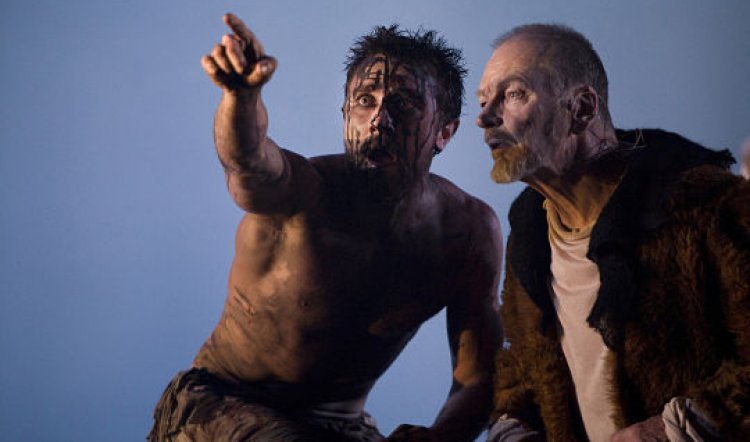
King Lear
KING LEAR Bell Shakespeare Company at the Drama Theatre, Sydney Opera House, March 10-April 10, 2010, then touring. Pictured above: Josh McConville and John Bell.
KINSHIP is at the heart of Shakespeare’s grand and rambling tragedy of 1606 - or thereabouts. At that time, in Elizabethan England, heirs, inheritance and blood were of supreme importance in the governance and maintenance of the state and its high families. So, although it’s thought the playwright based this play on an old English tale of an aged king ill-treated by his daughters, the outcome here is much more complex. Nothing is black and white and the shades of grey are many.
Lear commonly begins with a couple of the king’s men discussing their favoured and not so favoured sons, but director Marion Potts has chosen to cut to the chase. The ageing king enters in a flurry of entourage and furs in the act of telling his three daughters he plans to divide his realm between them, depending on their love for him. Instantly backs stiffen in the auditorium as a ripple of anxiety passes through the crowd. Who hasn’t been involved in an inheritance war – even as an onlooker? The news is full of the fall-out from Wills contested, overturned, lost, rewritten, doctored; feckless offspring usurping the legitimate claims of siblings; parents wreaking revenge on ingrate brats; children wreaking havoc on withholding parents – and on and on it goes.
Goneril (Jane Montgomery Griffith), Regan (Leah Purcell) and Cordelia (Susan Prior) respectively demonstrate calculating, dutiful and naive daughterliness as the family is circled by the inevitable aristocratic wolves. They watch keenly for weakness or opportunity, smiling and genuflecting but waiting only for the chance to pounce. For members of the Elizabethan court it must have been unnervingly like watching a documentary of their own lives. It’s not that different in 2010 except we’ve been fed ridiculous lines about familial trust and love and their opposite – the dysfunctional family – when the truth is, our social units can be as corroded by paranoia, money and suspicion as any that sat in the stalls at the Globe Theatre.
All these thoughts and more are free to flow in the face of a production that’s been stripped back to a visual emptiness that is at the same time rich and permitting of the viewer’s imagination (designer Dale Ferguson). The play opens on a small raised revolve, marooned in the middle of the highly lit expanse of the Drama Theatre stage. Long sheets of semi-opaque plastic temporarily enclose it; inside are shadowy figures. The effect is to conjure up the chilly, unwelcoming and uneasily mysterious spaces that passed for “home” in so many English palaces and castles. Small wonder that such forbidding places were the breeding ground for plots, schemes, murder and misery. No amount of pale sunlight or guttering candles could illuminate or warm them.
Playing the King for the third time in his career, John Bell begins with energy and optimism. He is lord of all he surveys; he has three daughters who love him. Loyal courtiers and friends surround him. All is good. Unfortunately, it is the very elements that comfort him that also contribute to hubris and the fatal presumption of absolute power. When Cordelia, his youngest and favourite daughter, unexpectedly crosses him the change in his demeanour is instant and catastrophic. Unlike the elder two – eager to please and mindful of their expectations – when he asks them all to tell him how much they love him, Cordelia realises it is an impossible question. She cannot answer: she cannot express how much she loves him.
Banished to France with a new husband – and also the King of France – who pragmatically overlooks her withdrawn dowry, Cordelia is the King’s undoing. Bereft of his favourite, realising his power is waning fast and accustomed to the pleasures of autocracy which is also disappearing, Lear begins to come apart. His only solace is The Fool (Peter Carroll) who is, of course, the only member of his court who tells the truth – and makes him laugh. Ironically, the capering, aged rhymster is his only equal because the Fool does not fear him.
Proving that it is not only daughters who can break a foolish old man’s heart, Gloucester (Bruce Myles) – he of the play’s initial exchange about legitimacy and bastardry which is cut from this production – is agonising over his sons. The illegitimate Edmund (Tim Walter) is up to no good. Predictably, he wants what his brother and the legitimate heir Edgar (Josh McConville) has. More dangerously, he is the object of desire of both Regan and Goneril, married women and, in their own ways, as ruthless as he.

Set up by his brother as a would-be patricidal scoundrel, Edgar flees to the outlands disguised as a crazy beggar Poor Tom. A desolate Gloucester, meanwhile, discovering that Regan and Goneril are plotting against the King, tries to intervene and has his eyes put out for his trouble. He too ends up wandering the outlands – or blasted heath as it would have been known – where he is found and protected by Poor Tom. Also rambling the wilderness in his own state of disintegration is Lear, accompanied by his Fool and the loyal Kent (Peter Kowitz).
The dangerous Cornwall (Anthony Phelan and the not dangerous Oswald (Yalin Ozucelik) make up the rest of the court and are reminders of the hazards to be found in allowing minor members of a household too much time to think.
The plot is wildly convoluted, from a 2010 standpoint, but when the reality of England’s royal houses and its aristocracy is taken into account, it is merely a retelling of history. These people, whether related by blood, necessity or ambition, are all the same under their lavish fur robes – a point made with some subtlety through the flesh coloured, long sleeved undershirts worn by each member of the cast.
The action – physical and emotional – is punctuated, from an augmented kit at the side of the stage, by percussionist and composer Bree van Reyk. It brings an extra element to the production with washes of sound that sound both contemporary and archaic by turns. With the restrained look of the setting and costumes – even the blood is darkly dry and faded, as is Edgar’s protective body smearing of mud and excrement. In every way but its capacity to stick in the mind, this Lear could not be more different than the previous Bell production, the infamous and occasionally hilarious Barrie Kosky extravaganza.
There is a sustained, exquisitely calibrated performance by the veteran Bell in the title role. It guides the inexorable downhill journey to utter disaster and grief that is also marked by a range of fine performances from actors who know, at all times, who they are and why they are where they are; which is not as common or simple as it sounds. Hysteria, sentiment and any other modern response to the horrors of what happens is never an issue. Tragedy and betrayal are so much part of that life and milieu that for a man (Lear) who has reached the almost inconceivable old age of 80, the only way out is simple insanity and a broken heart.
In a curious way, the clarity and coolness Potts has brought to the play – rather than the often over-wrought frenzy that is our media-driven way of dealing with the undealable – actually has the effect of making it more memorable and indelibly imprinted on the mind. For the key production of its twentieth year Bell Shakespeare Company has achieved a significant and satisfying milestone in many, many ways.



